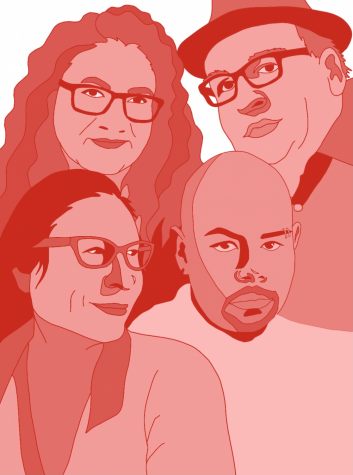Latinx playwrights celebrate art and language in “On Borders and Hybridity: Contemporary Latinx Theater”
April 19, 2021
With their faces luminous against luscious, floral Zoom backdrops, playwrights Migdalia Cruz, Elaine Romero, Luis Alfaro and Enrique Urueta addressed the Whitman community Friday evening in a lecture panel entitled “On Borders and Hybridity: Contemporary Latinx Theatre.” The event was co-moderated by Urueta and Laura Hope, a Whitman professor of theater and dance.
This was the third event in the “State of the Arts” spring guest series held by the theater department. Urueta and Hope posed a series of questions to the panel regarding everything from their introductions to the world of theater to the relationship between language and identity.
For Alfaro, his journey into the world of theater was fundamentally rooted in collaboration.
“I had to assist a ton of people and sleep on a lot of floors,” Alfaro said.

He found forming collectives to be a foundational part of his experience, putting on yard sales and group shows as ways to value collaborative contributions and creativity. He also ran an AIDS hospice in Los Angeles.
Cruz described her journey of entering the theatrical world at the age of six, when she wrote a play about a Black man burning a group of Klan members with a smoldering cigarette.
“I wanted to tell stories that humanized people,” she said.
But for her, one of the most significant struggles in becoming an artist was learning to be proud of her work. She showed photos of her mother’s home country of Puerto Rico and of their home in the Bronx after their building was demolished.
As she spoke, describing her subsequent search for her true home, tears began to well in her eyes.
As a child, Romero thought she would never learn to read. Through the guidance of her mother, an educator, she discovered her gift for working with words and began writing poetry during her classes. At fifteen, she wrote a short story about a man whose brother dies in Vietnam, and her passion for storytelling was ignited. She completed her undergraduate degree in three years and was immediately accepted into graduate school at UC Davis when she was twenty-one.
The first piece of work she published was a monologue which she abandoned the first draft of but later chose to salvage.
“I didn’t recognize my own sound,” Romero said.
Under the impression that they were playing a cruel joke, a school bully signed Urueta up for his first play in high school. He loved it and went on to register for a theater seminar in college. He chose theater because he thought it would be easy, but it was there that his passion for the stage truly awakened. Throughout the seminar, he discovered certain fundamental truths about the role of art in the world he occupied.
“Art isn’t just art for art’s sake,” Urueta said.
Rather, it is steeped in social, cultural and historical context and must be analyzed as such. As he spoke, he dug through his collection of Latinx play anthologies, spotlighting a few that contained work by his fellow panelists.
Soon, the conversation shifted toward the fundamental link between identity and language. The panelists debated the pros and cons of terms like Latinx, Latine and Latinao; how the first, while having its merits, is not necessarily compatible with the languages of the community to which it refers, while Latine is a more phonetically feasible equivalent. Romero also made it clear that “chicana” should not be left behind, referring to it as a “cozy identity” that is still linguistically relevant.
According to junior Taylor Kolkemo, who collaborated with Professor Hope on this event and helped with the technical aspects, the “State of the Arts” guest series was born when the theater department realized they had lost their spring season. Hope wanted to hold a series of artist panels to complement the broader Race, Violence and Health academic theme.
For Kolkemo, the event served to remind her of just how powerful art and theater can be.
“Theater extends language, it extends books — you can get so much more out of it and understand more than you even expect going to see theater,” Kolkemo said.
She hopes events like this encourage the Whitman community to give theater a try. “I know that the Whitman community is very white, but the Walla Walla community is very diverse, and it’s one of those things where I hope the Walla Walla community can become more involved with the Whitman community so we can feel more comfortable about putting shows on like that, by these artists,” Kolkemo said.
Junior Christian Gachet was encouraged to attend the event by Professor Hope. She had been teaching Gachet’s class on early modern medieval theater. “I am an immigrant — I’m from South America — so when I heard it was about contemporary Latinx theater, it was just, like, that was it!”
Gachet also thought the event had a lot to offer the Whitman community in terms of reframing its approach to activism.
“I think that it not just offers more diversity, but it also helps Whitman to expand their sense of political activism, or [of] what is happening in the world today. I think one limitation Whitman has as a university is that it’s pretty limited to the academic world. This event asks Whitman students to think beyond the academic.”
The next event in the “State of the Arts” spring guest series will be held on Friday, April 23 at 5 p.m. and is entitled “Torange Yeghiazarian: Putting the Middle East Center Stage.” You can register for it here.





